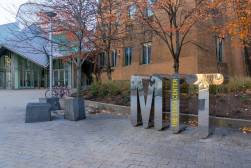University CIO role evolved during pandemic, says DeVry CIO

At many colleges and universities, chief information officers have become important decision makers in leveraging technology to advance teaching and learning. In an interview with EdScoop, Chris Campbell, chief information officer at the for-profit DeVry University, said the role of the CIO has continued to evolve during the health crisis into that of a key leader who works across the institution to find opportunities for improvement.
Technology has become increasingly important to advance the services and operations of an institution, from delivering classes online to streamlining business processes with improved data flow and analytics, Campbell said, and as a result, CIOs are no longer solely IT leaders, but help drive strategic initiatives for all departments of the institution.
“The CIO has an opportunity to bring how IT works to the university and leverage technology to solve an issue,” Campbell said.

Chris Campbell (LinkedIn)
And the job of the CIO is continuing to change, especially now that the pandemic has accelerated technology adoption and exposed how connected IT is to every function of the university, he said.
What is the role of the CIO in higher education?
“When I think about being a CIO in higher education, I think the role really is about being connected across the university, all departments and understanding truly the business of the university,” Campbell said. “CIO finds themselves today as as much a business consultant as they do a technologist.”
IT is no longer a single department in a university, he said, but spans the entire institution. And as a result, the CIO has to think more about technology at the institutional level and how it can be used to solve broad challenges and support universities’ goals of improving teaching and learning, and becoming more efficient businesses, ultimately to better support students and give them the best education opportunities possible, he said.
“It’s being in a position to connect the dots when appropriate, whether it is how to leverage existing technology to solve an issue, or whether it is looking into a new technology,” Campbell said. “Putting those things together is really what we do.”
How has the pandemic affected the role of the CIO?
The pandemic has forced colleges and universities to rapidly scale up their use of technologies — like video conferencing software, learning management systems and data analytics tools — to continue serving students and deliver on their core mission of educating students, Campbell said. But beyond that, colleges and universities have also had to rethink how they serve students as consumers of their services and conduct business more efficiently to overcome the challenges brought on by the pandemic, he said.
“The remote learning, remote delivery of capability, both on the college’s side, faculty side and students side is something that got pushed really front and center,” Campbell said. “And that opportunity afforded to many CIO to be in the conversation around how those challenges were going to be solved.”
CIOs also became key players in institutions’ emergency responses, addressing concerns around how to manage a pandemic, potential returns to campus and what technology would help the institution adapt to the new modality of learning and work, he said.
As CIO at DeVry, Campbell said he said he has always been included in conversations on how to advance the institution’s priorities and improve teaching and learning at the university.
“I’ve been fortunate to be in a role that’s been a member of the senior team,” he said.
But now, in solving the challenges of education during a pandemic, Campbell said he has seen many of his peers in higher education brought to the table of key decision makers to help their institutions navigate the current health crisis and emerge on the other side better able to serve the different needs of all students.
“There’s a realization, especially when remote learning kicked in, that very little can be done without some form of technology, either leveraging it or deploying it or managing it,” he said. “And technology in all its forms, touches everybody’s job every day.”
Where does the role of the university CIO go from here?
But even though the pandemic has brought with it rapid change in how CIOs work with their institutions, the opportunities for continued growth are not over, Campbell said.
“One of the things that we’re starting to see is CIOs becoming leaders of strategic initiatives that are not technology based,” he said.
The role of the CIO is going to continue to evolve and elevate technology leaders into drivers of institutional priorities like student success, he said, which are not necessarily technology projects, but can leverage the resources of IT.
“So CIOs are not upgrading anything or installing anything, rather we’re looking across the student journey for opportunity,” Campbell said.
But to get to that point, where CIOs take a seat at the senior leadership table, Campbell said, institutions need to bring technologists into their conversations about the institution’s long-term goals. And CIOs need to work to develop strong relationships with other leaders at their institution to begin driving change and finding opportunities to leverage technology in new and innovative ways.
“CIOs and their teams bring a tremendous amount of thought leadership on how to use technology, the consumption of technology and user experience,” Campbell said. “And these are all things that can be brought to the table to help and assist the university.”




